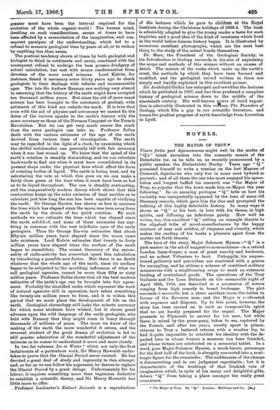NOVELS.
THE MAYOR OF TROY.*
Vixere fortes post Agamemnona might well be the motto of " Q's " latest excursion into the romantic annals of the Delectable (or, as he tells us, as recently pronounced by a public speaker, the Dialectable) Duchy. Years ago "Q " promised himself to write a treatise on the lost Mayors- of Cornwall, dignitaries who only live in some neat byword or proverb; and of all these the one who most engaged his specu- lation and longest baffled his research was "the Mayor of Troy, so popular that the town made him ex-Mayor the year following." In an amusing prologue "Q" tells us how his curiosity was unexpectedly appeased by the loan of some old Staunary records, which gave him the clue and prompted the inditing of this highly delectable history. In many ways it shows us " Q " at his best, in love with his theme, in high spirits, and diffusing an infectious gaiety. How well he writes, too, this excellent "Q," setting an example therein to the slipshod tribe of novel-manufacturers by the happy mixture of ease and artifice, of elegance and vivacity, which makes the reading of his books a pleasure apart from the matter set forth therein.
The hero of the story, Major Solomon Hymen—" Q" is a past-master in the art of suggestive nomenclature—is a retired London linen-draper, a man of great suavity and bonhomie, and an ardent Volunteer to boot. Unhappily, his unques- tioned gallantry and patriotism are combined with a genius for smuggling, and he utilises a scheme of combined military manceuvres with a neighbouring corps to mask an extensive landing of contraband goods. The operations of the Troy Gallants and the Looe Diehards on the memorable night of April 30th, 1804, are described in a succession of scenes ranging from high comedy to broad burlesque. The plot succeeds a merveille, but a sheer accident turns the tables in favour of the Revenue men, and the Major is c.nfronted with exposure and disgrace. Up to this point, however, the story has been carried on in such an irresponsible spirit that we are hardly prepared for the sequel. The Major proceeds to Plymouth to answer for his men, but while there is seized by the press-gang, taken to sea, captured by the French, and after ten years, mostly spent in prison, returns to Troy a battered veteran with a wooden leg, to find it quite impossible to establish his identity with the de- parted hero in whose honour a museum has been founded, and whose virtues are celebrated on a memorial tablet. In a word, poor Major Solomon Hymen, a mock-heroic personage for the first half of the book, is abruptly converted into a semi- tragic figure for the remainder. The suddenness of the change is disconcerting, and in our judgment regrettable ; but it is characteristic of the workings of that freakish vein of imagination which, in spite of his many and delightful gifts, debars "Q" from taking a place amongst the really great romancers.
The Mayor of Troy. By "Q." London : Methuen and Co. [al..]






































 Previous page
Previous page